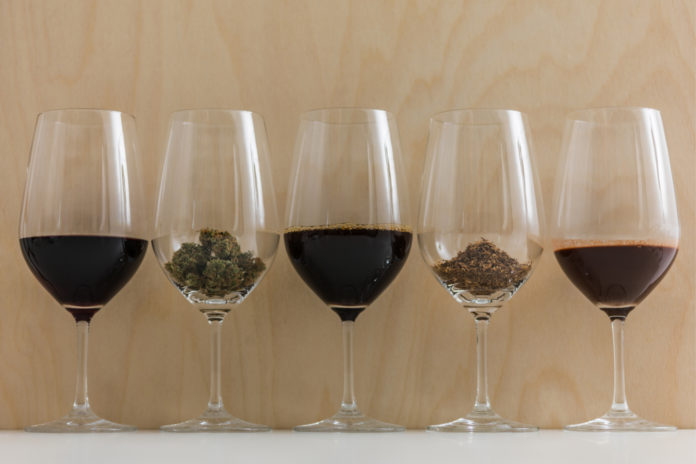The office cocktail trolleys of the “Mad Men” era are making way for cannabis happy hours in some states where the plant is legal. People across the country are turning to CBD when they want to relax during the day. Evenings of cannabis-focused meals and puffing and painting classes have become increasingly popular.
It’s great news for the growing cannabis industry, but the mainstreaming of cannabis is making big alcohol nervous. U.S. alcohol consumption dropped every year for the last three, led by declining beer sales, which have fallen 2.8 percent since 2015. One analyst told Bloomberg beer is “the canary in the coal mine” for the alcohol industry. “You’re seeing an erosion among consumers who now are able to choose between cannabis and beer,” said John Kagia, an analyst at New Frontier Data.
In counties where medical cannabis is legal, monthly alcohol sales over the last ten years fell an average of 15 percent. One of Canada’s largest banks predicts that cannabis will be a $6.5 billion industry in that country by next year—a cool $1.4 billion more than liquor sales in 2017.
Beverage companies are responding to this trend by making their own investments in cannabis—where they can (which for right now means Canada). Alcohol and tobacco companies accounted for more than a third of last year’s record $15 billion mergers and acquisitions in the cannabis industry, according to a Quartz report. Constellation Brands, makers of wines, liquors, and beers, including Corona, invested $4 billion last year in cannabis company Canopy Growth. AB InBev, owner of Budweiser and Labatt beers, is researching non-alcoholic beverages containing THC and CBD through a $100 million joint partnership with Tilray. Meanwhile, Heineken already has released a sparkling cannabis drink, Lagunitas Hi-Fi Hops. It’s “IPA inspired” and loaded with hops and THC, but no alcohol.
These companies are hoping to position themselves to pounce on the U.S. cannabis industry once it becomes legal nationally. Today, cannabis is legal in two-thirds of states but still considered a Schedule I drug, on par with heroin, at the federal level. That limits how much banks can be involved in cannabis deals, which makes it almost impossible for public (or large private) companies to make cannabis investments in the U.S.
But if these companies can get a big enough toe hold in Canada and start producing and marketing cannabis-infused drinks, they hope they’ll be well-positioned to take on the still smallish U.S. cannabis companies controlling local markets today.
These companies stand to pose a serious threat to the cannabis industry except for one important fact—cannabis-infused drinks still are very much a work in progress. Cannabis has a strong flavor and companies must work hard to hide the taste, sometimes described as “funky” or “skunky,” that experienced cannabis users might like but that is challenging to a new user.
It also can be difficult to manage proper dosing in cannabis drinks. While most people know what happens when they drink one glass of wine, that calculus can be wildly different when consuming a cannabis drink. Until there’s a scientific breakthrough that renders CBD and THC isolates odorless and tasteless—and allows for more controlled dosing—cannabis drinks may not find as large a customer base as edibles or vapes. Drinks also are still a small piece of the cannabis pie. Most people are consuming cannabis via vaping and edibles.
That doesn’t mean cannabis companies shouldn’t take the potential threat from big alcohol seriously. All this investment from big alcohol is making the big cannabis companies even bigger, which will make it harder for smaller, local companies to compete when prohibition finally is lifted. But as an industry that was founded on an outlaw culture—it was after all, actually illegal—goes mainstream, the companies that can attract consumers and build brand loyalty will be the big winners.
 Jason Vegotsky is an entrepreneur with an extensive background in sales and business development. As chief revenue officer for Kush Supply Co. he leads a team of over forty-five sales professionals; handles operations, shared services, and project management; and is responsible for expanding the company’s nationwide physical presence.
Jason Vegotsky is an entrepreneur with an extensive background in sales and business development. As chief revenue officer for Kush Supply Co. he leads a team of over forty-five sales professionals; handles operations, shared services, and project management; and is responsible for expanding the company’s nationwide physical presence.










